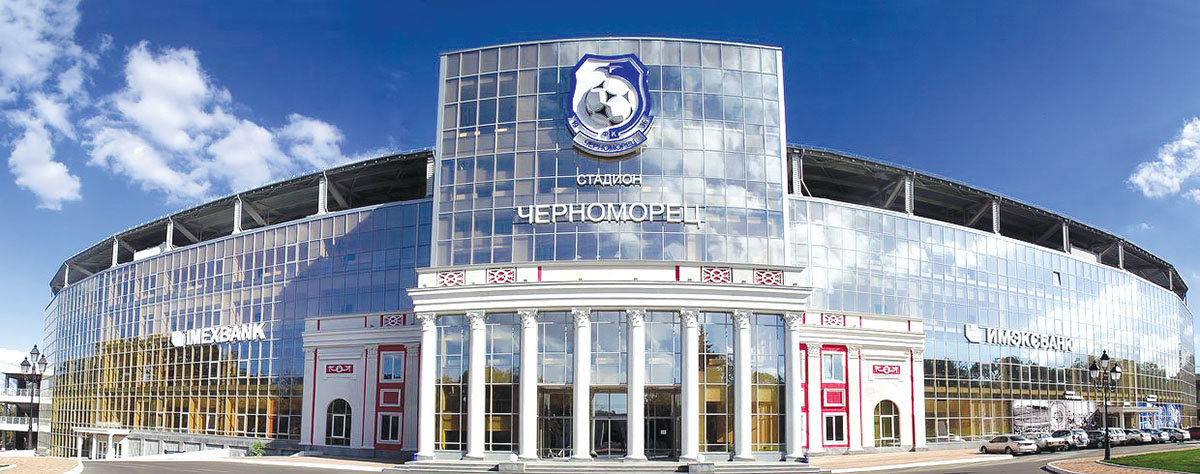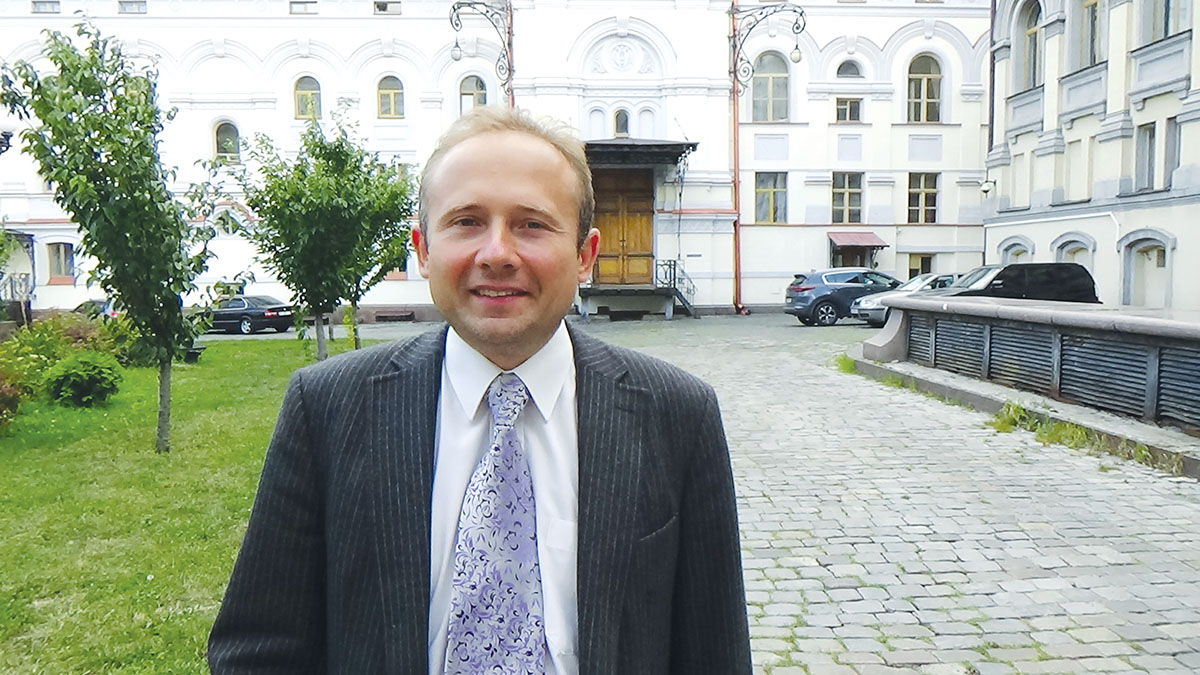It’s one of the largest and most modern soccer stadiums in Ukraine. But on Aug. 8, the port city of Odesa’s Chornomorets arena will go under the hammer with a price tag of Hr 733 million ($28 million) to recoup loan obligations.
That might sound like a lot, but the auction price has been falling rapidly since May 2018.
The arena was fully rebuilt for the Euro 2012 soccer championship, but did not hold a single Euro match, as Odesa — a city of roughly a million inhabitants located 500 kilometers to the south of Kyiv — failed to qualify for the event.
Now, due to an insolvent bank and insider loans, the stadium is being auctioned off as a distressed asset. United States-based loan seller First Financial Network has been contracted to handle the sale internationally. All attempts at selling the arena in Ukraine during 2018 failed.
Struggling to sell a distressed asset is hardly an uncommon situation in Ukraine. But there is one key difference with Chornomorets: this distressed asset is paired with a distressed soccer team.
Serhiy Syvolap, director of the arena and facility manager for the Chornomorets soccer club, says that his formula for making the stadium profitable is “playing good soccer, making it to the global level and raising (ticket) prices to the global level.”
But that doesn’t appear to be happening. In June 2018, the Chornomorets club was relegated to Ukraine’s second-tier league.
Historic arena
Chornomorets is located in the city’s central Taras Shevchenko Park, which was built on the site of the 14th century Turkish fortress of Khadjibey.

The entrance to Chornomorets soccer arena in Odesa. The arena stands in the city’s central Taras Shevchenko Park. (stadium.odessa.ua)
The fortress was a strategic stronghold on the northern shore of the Black Sea and the site of many battles for its control. In 1789, Russian Imperial forces captured Khadjibey from the Turks, an event that ultimately led to the founding of Odesa.
Soccer has been played on this site since the early 20th century, and the Chornomorets team has seen some important wins there. The team won Ukraine’s soccer cup in 1992 and 1994. Most recently, in 2006, Chornomorets came in third in the national Ukrainian soccer championship.
Fans of the team show great devotion to the game. Last season, Chornomorets gathered the third largest crowds in Ukraine on average during home games, even though the team fared poorly in the country’s top league.
Last Sunday, on July 28, the Chornomorets arena held the 2019 Super Cup game between Shakhtar (Donetsk) and Dynamo (Kyiv). The Kyiv team won 2:1 and the arena sold more than 30,000 tickets, proving itself not entirely dependent on the successes and failures of the city club.
Elite sport, grand finance
Both the Chornomorets team and arena used to have one owner – Leonid Klimov, a local oligarch with more than a decade of political experience in Ukraine. Moreover, Klimov owned IMEXBANK, where he took insider loans and pledged his own assets as collateral.
In 2015, during the clean-up of Ukraine’s banking system organized by then-central bank chief Valeriya Gontareva, the Ukrainian authorities took control of IMEXBANK and began liquidation procedures, which continue to this day.
Aggressive insider loans have been a common practice in Ukraine, leading to the downfall of many a bank since 2014.
But despite losing his bank and arena, Klimov has clung to the soccer club, where he is president and his son Oleksiy serves as his deputy.
Klimov wields a lot of power in Odesa and its surrounding region, but his influence is waning. He was elected to the Ukrainian parliament eight consecutive times. However, this year on July 21, he failed to win reelection.
And Klimov still likely has some influence over the arena. Its director, Syvolap, also works for the Chornomorets club – and that means he also works for Klimov.
Selling it the hard way
In Ukraine, insolvent banks are managed by the state-run Deposit Guarantee Fund, which first tries to revive them under its control. If that fails, the banks go into liquidation. That means the fund will sell all the bank’s assets in order to repay outstanding obligations.
The first auction to sell Chornomorets arena took place on May 31, 2018. Back then, the price was more than Hr 1 billion ($40 million). In 2018, the Deposit Guarantee Fund tried to sell the arena six times on the Ukrainian ProZorro online procurement platform.
The price tag decreased several times in 2018. By Aug. 14, the starting price was Hr 718 million ($28 million). Still, there was no luck selling the arena.
“Many parties showed interest. But, unluckily, the price was quite high back then. In other words, we received feedback from everybody about the high price,” says Taras Yeleyko, director of the Deposit Guarantee Fund’s consolidated sales department.
Now, the fund has decided to improve its offer to make it more appealing to investors. Besides selling the stadium itself, the lot also includes a pool of 40 loans carrying additional assets of commercial value. Some of the loans feature the arena used as collateral.
As a result, on Aug. 8, 2019, investors will be able to buy the arena, which includes a business center with a restaurant, a hotel, a gym, a parking lot and several other buildings — plus the loan agreements.
Going global
Besides improving the offer, the arena will have a global marketing campaign. First Financial Network, a global player in the field of loan sales, is actively advertising the lot.
First Financial Network is also working on other assignments of the Deposit Guarantee Fund and the National Bank of Ukraine. In a press release, the network stated that it is “initiating a highly targeted marketing campaign to develop strong groups of purchasers in order to maximize sales proceeds and minimize losses for Ukraine.” The network’s president, John Morris, anticipates “strong interest from Ukraine and international investors for these assets”
Andriy Khraban represents First Financial Network on the ground in Ukraine. He is in charge of organizing all the work locally and cooperating with the Deposit Guarantee Fund and potential investors. Before speaking with the Kyiv Post on July 24, he spent several days on site in Odesa.
Both Ukrainian and international bidders have shown interest in the lot, he says.
“It is more difficult with the Ukrainian (bidders) because Ukrainians are afraid of the former owner,” Khraban told the Kyiv Post. “But if there is a foreign buyer, he has nobody to be afraid of. Because the whole world stands behind him… including the American embassy if it is an American. So, there are absolutely different instruments of influence.”
However, there are challenges. Chornomorets arena is an unusual asset, so many investors will not be able to make use of it.

Andriy Khraban is director of First Financial Network Ukraine LLC, which is a part of First Financial Network, Inc. (Courtesy)
“Stadiums, resorts and such strategic big assets are usually complex. Besides buying an asset, you are buying the business itself,” says Volodymyr Mysak, head of capital markets at real estate consultancy Cushman & Wakefield in Ukraine. “It is not just buying an object with tenants and simply managing real estate. You have to get into the operations. That means working strategically.”
Khraban understands that the arena demands a strategic buyer. For this reason, he is trying to unite the efforts of several investors to pool funds.
“I am considering a combination of an investor interested in real estate and an investor interested in sports,” he says.
As of now, the city authorities are not heavily involved in the process. But they will get their say once an investor is found. The city will have the power to coordinate the re-design of the arena’s territory and the sites adjacent to it: streets, sewage systems, and passageways.
“It’s a big sports facility (and site of) tourism and sports infrastructure for the city. Who the owner will be is not our business, but it is very important for us that the stadium works well,” says Tetyana Markova, who heads the city council’s tourism department.
Syvolap, who runs the stadium, agrees.
While the arena is loss-making and fills just under 5,000 of a total 30,000 seats on average, “it’s a social facility for Odesa residents,” he says.
